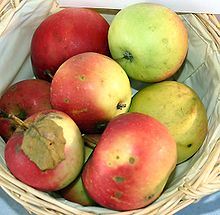Jonathan (apple)
| Malus domestica Jonathan | |
|---|---|
 | |
| Species | Malus domestica |
| Cultivar | Jonathan |
| Origin | Woodstock, New York, before 1826[1] |
The Jonathan apple is a medium-sized sweet[1] apple, with a touch of acid[2] and a tough but smooth skin. It is closely related to the Esopus Spitzenburg apple, good for eating fresh and for cooking.[2]
History
There are two alternative theories about the origin of the Jonathan apple.
The first is that it was grown by Rachel Negus Higley. Mrs. Higley gathered seeds from the local cider mill in Connecticut before the family made their journey to the wilds of Ohio in 1796 where she planted them.[3] She continued to carefully cultivate her orchard to maturity and named the resulting variety after a young local boy that frequented her orchard: Jonathan Lash.[citation needed]
The other, and more accepted, theory is that it originated from an Esopus Spitzenburg seedling in 1826 from the farm of Philip Rick in Woodstock, Ulster County, New York. Although it may have originally been called the "Rick" apple, it was soon renamed by Judge Buel, President of Albany Horticultural Society, after Jonathan Zander, who discovered the apple and brought it to Buel's attention.[4][2]
Descendants
- Jonagold—a cross between Jonathan and Golden Delicious apples
- Jonamac—a cross between Jonathan and McIntosh apples
- Rubinstar
- Idared
- Melrose
- Undine
- Akane
- Querina Florina (scab resistant)
Disease susceptibility
References
- ^ a b "Jonathan", National Fruit Collection, retrieved 7 November 2015
- ^ a b c Beach, S.A.; Booth, N.O.; Taylor, O.M. (1905), "Jonathan", The apples of New York, vol. 1, Albany: J. B. Lyon, pp. 172–174
- ^ Mary Coffin Johnson, The Higleys and their ancestry, D. Appleton and Company, New York, 1896
- ^ Southwest Regis-Tree Archived 2006-12-22 at the Wayback Machine- Tree of Heirloom Perennial Species and Varieties
- ^ Dr. Stephen Miller of the USDA Fruit Research Lab in Kearneysville, West Virginia.[full citation needed]
